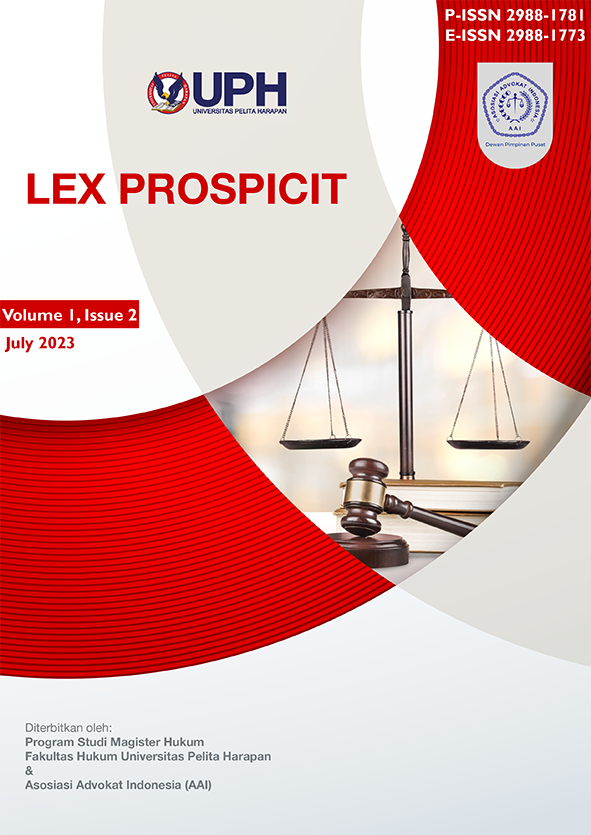The Existence of Notary Cooperation with Online Service Bureaus in the Making of Deeds of Establishment of Limited Liability Companies
DOI:
https://doi.org/10.19166/lp.v1i2.7597Keywords:
Online Service Bureaus, Notary Professional Organization, Notary Code of EthicsAbstract
Notaries are authorized to mold all actions, agreements, and determinations desired by the parties who come to them to confirm them and pour into an authentic deed, aiming for the deed to have complete evidential power and validity. Therefore, notaries are obliged to fulfill all the provisions of their positions and other regulations and are responsible for the deeds they have prepared. In practice, especially since Covid-19 there are still notaries who cooperate with online service bureaus. The type of study is empirical juridical, which in other words is a type of sociological legal research, also known as field research, which examines the applicable legal provisions and what happens in reality in the community. From the research results obtained from decision No.36/PID.SUS/TPK/2014/PN.JKT.PST in conjunction with Cassation Court Decision No. 980 K/Pid.Sus/2015, that a notary does not check documents (the ID Card) in the creation of a company, and they aren’t to meet directly before the Notary, but with a service bureau. In this case, it is related to the validity of the company establishment deed that has been made by a notary in collaboration with an online service bureau, where the appearer does not appear before the notary because the one who appears before the notary is the service bureau. One of the main advantages of notary cooperation with online service bureaus is of course that it is not bound by working time. That the cooperation between the notaries does not have a written work bond but only in the form of verbal, however, such actions still violate the UUJN and the Notary Code of Ethics, and there have been lacunae in the law to regulate cooperation between notary and online service bureau. In the case that the author raises, notary cooperation with service bureaus is prone to criminal acts (corruption or fraud), therefore the company's deed of establishment becomes null and void. Second, the responsibility of the Notary Professional Organization, towards the Notary who cooperates with the online service bureau, which violates the provisions of the UUJN and the Code of Ethics, then based on Article 4 number 4 of the Notary Code of Ethics, it is said that the act of cooperating with an online service bureau is categorized as a violation of the notary code of ethics, which is accompanied by sanctions in the form of: Reprimand; Warning; Temporary dismissal from Association membership; Honorable dismissal from Association membership; and Dishonorable dismissal from Association membership. The INI's responsibility as a notary professional organization is as a form of providing duties and authority in providing guidance, supervision and protection to notaries.
References
Journal Articles / Artikel Jurnal
Amilia, Ni Komang Sri Intan, and I Gede Yusa. “Akibat Hukum Pelanggaran Kewajiban Notaris Terhadap Ketentuan Pasal 3 Angka 15 Kode Etik Notaris.” Acta Comitas Jurnal Hukum Kenotariatan 6, no. 3 (December 2021): 510-522. https://ojs.unud.ac.id/index.php/ActaComitas/article/view/72692.
Arsy, Eudea Adeli, Hanif Nur Widhiyanti, and Patricia Audrey Ruslijanto. “Tanggung Jawab Notaris Terhadap Akta Yang Cacat Hukum Dan Tidak Sesuai Dengan Ketentuan Pembuatan Akta Dalam Undang-Undang Jabatan Notaris.” Jurnal Bina Mulia Hukum 6, no. 1 (September 2021): 130-140. https://jurnal.fh.unpad.ac.id/index.php/jbmh/article/view/324.
Kusmiati, N. Ike. “Undue Influence Sebagai Faktor Penyebab Cacat Kehendak Diluar KUHPerdata, Dalam Upaya Mengisi Kekosongan Hukum.” Jurnal Litigasi 17, no. 1 (September 2016): 3256-3283. http://dx.doi.org/10.23969/litigasi.v17i1.97.
Raissafitri, Kayla, and Taipiqqurahman. “Keabsahan Akta Pendirian Perseroan Terbatas dengan Saham Harta Bersama Suami Istri ditinjau dari Asas Acta Piblica Probant Sese Ipsa.” Kertha Patrika 45, no. 1 (April 2023): 19-34. https://ojs.unud.ac.id/index.php/kerthapatrika/article/view/97306.
Widia, I Ketut, and I Nyoman Putu Budiartha. “Cacat Kehendak Sebagai Dasar Batalnya Perjanjian.” Kertha Wicaksana 16, no. 1 (2022): 1-6. https://doi.org/10.22225/kw.16.1.2022.1-6.
Books / Buku
Badrulzaman, Mariam Darus. Aneka Hukum Bisnis. Bandung: Alumni, 1994.
Harahap, Yahya. Hukum Perseroan Terbatas. Jakarta: Sinar Grafika, 2009.
Pengurus Pusat Ikatan Notaris Indonesia. 100 Tahun Ikatan Notaris Indonesia: Jati Diri Notaris Indonesia, Dulu, Sekarang dan di Masa Datang. Jakarta: PT Gramedia Pustaka, 2013.
Satrio, J. Perikatan yang Lahir dari Perjanjian. Bandung: Aditya Bakti, 1995.
Subekti. Pokok-Pokok Hukum Perdata. Jakarta: Pembimbing Masa, 2003.Sugandhi, R. Kitab Undang-Undang Hukum Pidana (KUHP) dan Penjelasannya. Jakarta: Usaha Nasional, 1981.
Others
Hive Five. "Tentang Kami.” https://hivefive.co.id/tentang-kami.
Mitra Jasa Legalitas. "Jasa Pengurusan Dan Pendirian PT." https://mitrajasalegalitas.com/jasa-pengurusan-dan-pendirian-pt.
Office Now. “Biro Jasa Pembuatan PT, Simak 5 Alasan Memilihnya Bagi Pemilik Bisnis.” https://www.officenow.co.id/biro-jasa-pembuatan-pt.
Putusan Pengadilan Negeri Jakarta Pusat Nomor 36/PID.SUS/TPK/2014/PN.JKT.PST.
Putusan Pengadilans Tingkat Kasasi Nomor 980 K/Pid.Sus/2015.
Downloads
Published
How to Cite
Issue
Section
License
Authors who publish with this journal agree to the following terms:
1) Authors retain copyright and grant the journal right of first publication with the work simultaneously licensed under a Creative Commons Attribution License (CC-BY-SA 4.0) that allows others to share the work with an acknowledgement of the work's authorship and initial publication in this journal.
2) Authors are able to enter into separate, additional contractual arrangements for the non-exclusive distribution of the journal's published version of the work (e.g., post it to an institutional repository or publish it in a book), with an acknowledgement of its initial publication in this journal.
3) Authors are permitted and encouraged to post their work online (e.g., in institutional repositories or on their website). The final published PDF should be used and bibliographic details that credit the publication in this journal should be included.


